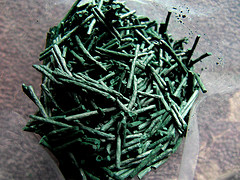
Spirulina has grown in popularity over the past several years. Claims about this freshwater plant have placed it at the top of the list of foods that support detox, cancer prevention and recovery, digestive health, eye health, cardiovascular health, athletic performance and energy levels. So, what is so great about spirulina? And is it worth all of the attention? See Spirulina’s nutrition facts below, provided by my favorite organic brand, ENERGYBits (nutrition facts can vary slightly between crops)!
Nutrition Facts (per 7.5 gram serving): (Based on % Daily Value)
Protein: 4.8 grams (64% protein content)
Carbohydrates: 1.4 grams
Fat: o.4 gram
Omega 3 Fatty Acids: 82.5 milligrams
Omega 7 Fatty Acids: 15 grams
Omega 6 Fatty Acids (GLA): 75 milligrams
Chlorophyll: 337 milligrams
Vitamin A (as beta-carotene): 100% DV
Thiamin (B1): 100%
Riboflavin (B2): 100%
Niacin (B3): 100%
Vitamin B6: 100%
Vitamin B12: 100%
Biotin: 10%
Pantothenic Acid (B5): 100%
Calcium: 3%
Iron: 100%
Magnesium: 11%
Zinc: 100%
Manganese: 100%
Sodium: 3%
Potassium: 25%
ORAC Value
Spirulina has one of the highest ORAC (oxygen radical absorbance capacity) values at 61,900, placing it above superfoods like goji berries (25,300), blueberries (2400) and spinach (1260). I am not recommending that you replace these fruits and veggies with spirulina! Regular intake of fresh fruits and veggies is essential to good health, and I would recommend that they be prioritized above spirulina use. However, I find the ORAC value system to be useful in giving you perspective on the nutrient concentration in many foods.
So…What Is It Good For?
Spirulina is rich in antioxidants, like vitamin A, chlorophyll, cartenoids and phytocyanin, that give it such a high ORAC value. These antioxidants are responsible for cleaning the blood and lymphatic system of toxic build-up and supporting liver, cardiovascular, eye, and digestive health. Additionally, these antioxidants can support athletic performance, recovery after long workouts, immunity against viral infections and protection against radiation poisoning. Additionally, spirulina’s rich vitamin B content make it an ideal supplement for many vegans and vegetarians who struggle to reach their B vitamin requirements!
Spirulina’s rich mineral content increases its value in bone and blood health. Calcium, iron, magnesium, manganese, zinc and potassium support healthy tissues, hydration levels and healthy oxygenated blood flow. This can be particularly helpful for those with anemia-related conditions and athletic lifestyles.
When Should It NOT Be Used?
Despite spirulina’s rich nutrient profile, its use is contraindicated with several conditions:
– Autoimmune Disease (Rheumatoid Arthritis, Multiple Sclerosis, Lupus, etc.): Spirulina is a powerful immune booster, and autoimmune diseases often result from an overactive immune system. Spirulina’s use is discouraged in those diagnosed with an autoimmune condition because of its potential to stimulate an autoimmune attack.
– Medications: Those taking Cyclosporine, Methotrexate or Azathioprine should avoid Spirulina, due to its possible interactions with these medications.
– Allergies: Spirulina contains iodine and phenylalanine, so those with allergies to seafood, shellfish and iodine and those diagnosed with Phenylketonuria (PKU) should avoid spirulina (and all algae).
– Severe symptoms with detox: Spirulina is a powerful detoxifier, which can be a good thing. However, those who experience extreme sleepiness, migraines, excessive gas or itchy skin should decrease their dosage of spirulina, as these symptoms can be signs of a detox overload.
– Toxicity: Spirulina is only as good as the environment it is grown in. It should always be organic, with no additives. If this is not the case, spirulina may contain microcystins, which can lead to liver disease. Sign of this toxicity include severe abdominal pain, yellow skin and dark urine. Quit taking spirulina immediately if you experience these symptoms.
When used correctly, Spirulina can be a powerful supplier of antioxidants, B vitamins, chlorophyll, Omega 3 fatty acids and other nutrients that support good health and disease prevention. To purchase some of your own, visit ENERGYBits.